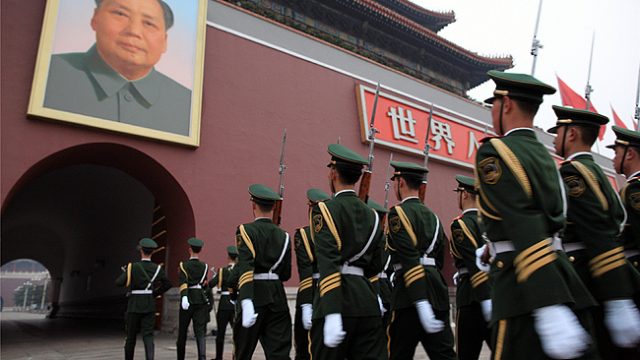Chinese institute spreads across U.S., but some say it also spreads propaganda

FORBIDDEN SUBJECT: Chinese soldier guards Tiananmen Square, and Confucius Institute professors don’t discuss events that happened there.
By Arthur Kane | Watchdog.org
During the past decade, the Confucius Institute has established itself at nearly 500 universities and K-12 schools in the United States and another roughly 500 around the world.
But some professors are urging schools to break with the Chinese language and cultural nonprofit, charging it is a “propaganda” arm of the Chinese government.
This year, several high-profile schools, like the University of Chicago and Penn State, jettisoned the program. But other large schools like Columbia University, UCLA, Colorado State University and the University of Oklahoma still have Confucius Institutes on their campuses, according to the CI website.
University of Chicago professor Bruce Lincoln said the Institute doesn’t honor academic freedom and its governing board is filled with Chinese Communist Politburo members.
“They have a story they want told, and that is to not be seen as a military and economic giant, but they want to persuade people (China is) a lovely place,” said Lincoln, who teaches the history of religion. “And they’ve been enormously successful.”
Lincoln said Institute books and materials place Tibet and Taiwan as parts of China — though University of Chicago didn’t accept those books — and teachers are trained to stop any conversations about Tibet or the 1989 massacre in Tiananmen Square if students bring the topics up in class.
University of Chicago didn’t renew its five-year agreement with the Institute last month citing comments in a Chinese publication by Institute Headquarters Executive Director Madame Xu Lin. University spokesman Steve Kloehn refused to provide any additional information, but Lincoln said Lin bragged that she bullied the UChicago president into ignoring faculty concerns about the Institute.
“The university jumped on the opportunity to terminate this thing” after the published comments, Lincoln said. “They realized (CI) was a bad idea.”
More than 100 University of Chicago professors signed a petition against the Institute when it came on campus five years ago, and a similar number protested the negotiations to renew the contract this year. The 2014 petition charges the Institute’s agenda is set by “high officials of the Party-State” and has “political constraints of free speech.” CI’s website said the program is under China’s education ministry.
Lincoln said the Institute’s actions do not, by design, raise red flags at most universities, calling the Institute’s work “soft propaganda.”
However, the petition says a teacher at McMaster University in Ontario, Canada, was fired when Institute staff learned she was a member of Falun Gong, a spiritual group suppressed in China.
The American Association of University Professors also urged schools to break with the Institute unless universities can retain control of recruitment and course work and protect professors’ academic freedom.
“North American universities permit Confucius Institutes to advance a state agenda in the recruitment and control of academic staff, in the choice of curriculum, and in the restriction of debate,” the June 2014 AAUP statement said.
But Colorado State University International Affairs Vice Provost Jim Cooney said the Institute on CSU’s campus is more about academic exchange on environmental and water issues and doesn’t provide classes for credit or any other potentially controversial programs.
“I can’t see any of the issues from the University of Chicago that are relevant to us,” he said. “The Institute plays no role in research and no role in teaching.”
He said he believes most major schools do not have the issues seen at the University of Chicago and some other schools.
But the U.S. State Department expressed concerns in 2012 when it issued a guidance directive about the Institute, saying only teachers, not professors or researchers, should be in K-12 schools and Institute programs need U.S. accreditation. The directive did not reference propaganda allegations cited by University of Chicago and AAUP.
CAMPUS CONTROVERSY: The University of Oklahoma is reconsidering its relationship with CI after other schools broke ties.
And some schools with programs are rethinking the relationship.
“In light of the State Department memorandum and the recent actions of some other higher education institutions, the University of Oklahoma is reviewing its relationship with the Confucius Institute program,” school spokeswoman Catherine F. Bishop wrote in an email statement.
The Institute’s template agreement with schools says the Institute is interested in building understanding between China and other cultures. “In order to strengthen educational cooperation between China and (country name), support and promote the development of Chinese language education, and increase mutual understanding among people in China and in (country name),” a copy of the template obtained by Watchdog.org says.
CI representatives at U.S. colleges and in China either did not respond or were not available for interviews.
The Institute’s template agreement, which University of Chicago modified before signing, also requires schools to keep the agreement “confidential,” leading professors to charge the Institute is against transparency.
Like University of Chicago spokesman, Penn State took a similar tactic on transparency when Watchdog.org asked why the school broke their relationships with the Institute.
“The dean’s statement is below and we are not commenting further on this issue,” wrote Penn State University spokeswoman Lisa Powers in an email.
Penn State’s statement said several of CI’s goals are not “consistent” with Penn State’s, the Institute will be gone by the end of the year and that will not impact Chinese studies at the school.
Lincoln said despite tight budgets, schools should not open their doors to programs, whether run by corporations, friendly nations or unfriendly countries, which do not promote academic freedom.
“A university has to take responsibility for its own faculty, its own courses,” he said. “Once you take that away, you’ve given away the store and are no longer an impartial university. You’re like a shopping mall where anyone can set up a boutique and sell their wares.”







